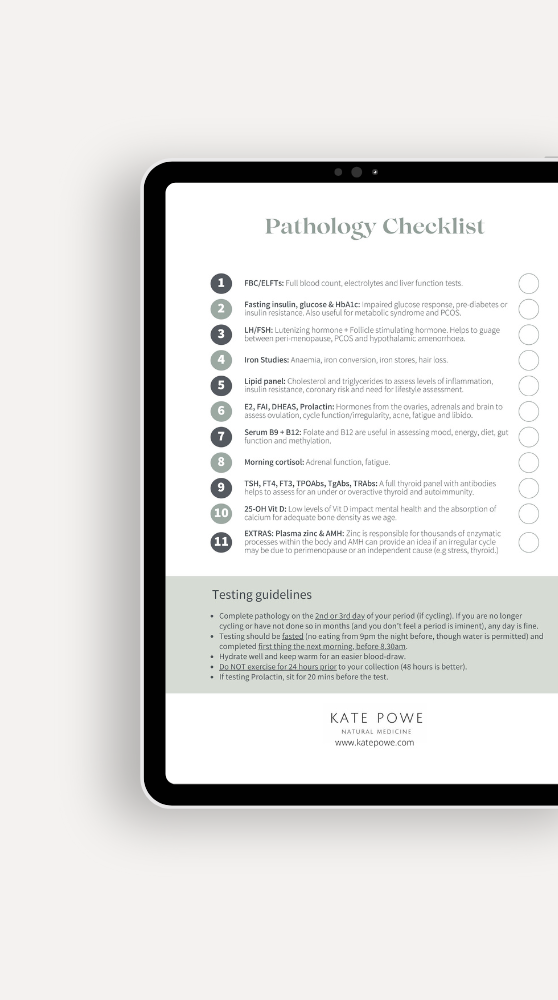Ah Folate (aka Vitamin B9). I’ve always had a bit of a thing for it really.
I don’t know if it’s the association with luscious green leafy vegetation (from whence it comes) or the association I have with it being a particularly feminine vitamin (yeah, it’s not…but maybe it’s the whole pre-conception/baby association thing).
So when I started to hear vicious rumours sneakily seeping into my awareness about its potential problems, I was the first to dive into truth-finding mode. My interest sparked even more when I started pulling at a lone string and unraveled an entire Tourism Victoria ad’s worth of yarn. My head is still spinning. And yet it’s led me on a wild chase of understanding not only folate, but how its own cycle interacts with a multitude of methylation processes and potential problems throughout the body’s biochemistry, involving DNA, genetic polymorphisms (defects) and how this all impacts up an array of chronic and genetic diseases.
But I digress. Let’s start at the very beginning.
Folate is a B-vitamin, essential for numerous biological processes. These range from synthesis of nucleic acids (DNA + RNA) and neurotransmitters such as dopamine, adrenalin, noradrenalin and serotonin to production of the master antioxidant, glutathione for detoxification. It’s integral for immune health and is required for the formation of healthy red blood cells (important therefore in the prevention of megaloblastic anaemia) and platelet production. It helps lower homocysteine, high levels of which have been linked to increased cardiovascular risk, and has a key role to play in neurological health, apparent prevention of neural tube defects and mental health disorders such as depression.
Folate vs Folic Acid vs Folinic Acid: What’s the difference?
- Folate is a naturally occurring, water-soluble B vitamin found primarily in dark leafy green veg, broccoli, asparagus, legumes, lentils, liver and kidney (liver salad anyone?)
- Folic Acid is a man-made, or synthetic form of folate found in your vitamin supplements and fortified foods.
- Folinic Acid (5-formyltetrahydrofolate) is the active form of folate available in some practitioner-only supplements (and in your body, is just a hop, skip and a jump away from the body’s bioactive form, 5-MTHF [5-methyltetrahydrofolate or methylfolate]).
For some time now, the synthetic form of folate, folic acid, has been adopted as the golden child of vitamin supplements.
It’s routinely dished out in pre-pregnancy formulas to prevent neural tube defects, co-prescribed with medications such as Methotrexate as an antidote to its side-effects and pumped into a number of everyday foods such as bread and breakfast cereals to boost dietary intake.
However, with expanding awareness in the field of nutrigenomics, we’re learning, surprise surprise, that the synthetic form of this key vitamin may be doing more harm than good.
Why?
As we know, folic acid is a completely synthetic compound. It requires conversion to dihydrofolate (DHF), then tetrahydrofolate (THF) before it can be swiftly processed into methylfolate, the active form of folate used within the cell for DNA reproduction and regulation of the methylation cycle, which in turn regulates homocysteine and the cysteine cycle.
The problem lies in that initial conversion from folic acid to DHF. It’s slow, labour-intensive and invariably leads to a build-up of unmetabolised folic acid (UMFA) being dumped into your bloodstream (see diagram).
 Some studies suggest this isn’t a problem, yet others link increased UMFA with a decrease in Natural Killer Cell (NKC) activity meaning lowered immunity, and potential increased risk for breast cancer.
Some studies suggest this isn’t a problem, yet others link increased UMFA with a decrease in Natural Killer Cell (NKC) activity meaning lowered immunity, and potential increased risk for breast cancer.
In fact, a collection of studies on folic acid supplementation report:
- an increased risk in lung cancer development and mortality
- a 67% increased risk of developing potentially malignant advanced lesions in those genetically predisposed to colorectal cancer at a dose of 1mg p/d
- mixed findings on a dose of 400mcg p/d in breast cancer risk amongst women, with the Women’s Antioxidant and Folic Acid Cardiovascular study finding no association and a separate observational study finding a 20% increased risk of breast cancer development.
- a lack of evidence to suggest supplementation is protective against breast, prostate, colorectal or endometrial cancer
- An interesting comparison between dietary folate and supplemental folic acid, with a diet rich in folate found to be cancer protective, (one study finding reduced rates of pancreatic cancer), while folic acid supplements had either no effect or increased cancer risk.
And then there’s the elephant in the room: MTHFR.
Methylenetetrahydrofolate Reductase is a gene that produces an enzyme (with the same name…tricky), which, in some, is a bit dodgy. If you’re found to have a genetic hiccup on this gene, it can greatly impact your ability to metabolise folate in general (not just synthetic folic acid). I truly believe it’s going to be big as we discover more about genetic testing, epigenetics and preventative health.
Summary
- Folic acid is a completely synthetic form of folate and must undergo multiple conversions, the first of which is both slow and labour-intensive, to become active.
- When the body can’t convert folic acid, or it has more folic acid that it needs (too many vitamin supplements or fortified foods), it dumps the excess as UMFA into the blood stream which can decrease NKC activity and compromise immune health.
- A sub-optimal diet OR genetic polymorphisms in the MTHFR gene can also impact upon your ability to produce methylfolate, the form of folate required to push the many other methylation cycles in your body.
What can you do?
- Stop taking supplements with synthetic folic acid. If you’re still required to supplement folate (e.g. planning pregnancy, are anaemic or are clinically low in B9), ask your practitioner for one containing folinic acid (calcium folinate) which is an active form. NB: Folinic acid is still going to be problematic for those with the MTHFR polymorphism so talk to your health care practitioner if this is the case for you.
- Be aware of foods fortified with synthetic folic acid and be conscious of total daily folic acid intake. Current guidelines suggest a recommended daily intake of 400mcg p/d for women aged 19-70 years. In my books, the lower synthetic the better.
- Increase your natural dietary intake of raw, dark leafy green vegetables, e.g. kale. TIP: cooking depletes folate so make sure you get lots of leafy salads as well as your regular cooked veggies (if you cook veggies!) Go for less toast and cereal and more poached eggs with spinach or a green smoothie for a breakfast folate hit.
- Ensure a gut and liver-friendly, whole food diet (one with lots of greens, good fats/EFAs and minimal processed carbs) which is essential for proper folate metabolism.
Kate is a qualified naturopath who is passionate about helping women heal from hormonal havoc and inspiring women to know their own power, worth and wisdom.
Kate offers one-on-one Skype consults for irregular cycles, PMS and period pain, endometriosis, PCOS, peri-menopause, mood swings, fatigue and mental and emotional stress.
Simply drop me an email to see how I can help you!







11 thoughts on “Folic Acid: Could it be harming your health?”
It’s so wonderful to see awareness of this growing around the world! Great post!
Thank you Andrea! There’s so much to uncover in the MTHFR rabbit hole isn’t there! 🙂
Finally! Awareness! Thank you!! I have MTHFR which was only recently discovered after a very tough health experience. Treating it has helped in so many areas for me. This article is fab. I will share share share!!
Thank you Karise!! I’m so glad for you your health’s improved since investigating MTHFR. There are so few people who know anything about it so I’m just trying to teach myself all that I can as I think it really is the undiscovered key to a pile of problems we’re just completely unaware of. Please, share away!! 🙂 Thanks again for your feedback, greatly appreciated.
Pingback: MTHFR and Small Fiber Neuropathy • MTHFR Living
Am thinking of getting tested for mthfr but I am taking methotrexate and take folate 6 days of the week and mtx the other day. The folate helps with brain fog and the other side effects of mtx.
My question is if I have the mthfr gene what would I take instead of the folate, cause I have trouble focusing and remembering on mtx without it?
Hi Denise, methotrexate blocks folate so yes, you need to take folate with it. The problem is that most doctors prescribe Folic Acid (the synthetic form of folate) which is detrimental to those with MTHFR. You would need to see a GP or Naturopath to work with your case individually, but you may be able to get away with calcium folinate (folinic acid) depending on the snp, or you may be directed to take methylfolate (the most active form of folate), but it depends on your pathology/conditions treated. Best of luck.
Thankyou so much Kate. I am seeing my immunologist in May, but am thinking of getting tested for MTHFR before that so if I do have it I can ask him to prescribe something you have suggested.
I’m pregnant and I am taking a pregnancy multi vitamin that has folic acid in it. Should I stop taking it? The other leading brand that naturopaths recommend also has folic acid in it. Where do I go from here?
Viki, I would suggest you should stop taking folic acid, increase your natural folate sources and find a supplement that includes methylfolate (5-MTHF) if you can access it, else find a supplement that contains folinic acid. Different countries have different regulations, but there are pregnancy supplements by Seeking Health and Thorne as a starting point.
Great advice, tell that to the Rheumatologists and Encologists who go treat patients with the same knowledge they left Uni with, and haven’t bothered to update themselves on this important MTHFR and other metabolic disorders. They are potentially harming their patients with advice to take Folic Acid instead of Folinic Acid at least, Methylfolate at best. What will happen though if some women take methylfolate is they will get a methyltrap due to B12 deficiency and all the compexities of MTHFR, CBS etc and blame the doctor for their new problem. Awakening your methylation cycle is dangerous, so doctors simply take the easy way out with folic acid, see mthfr.net, can you blame them?
Comments are closed.